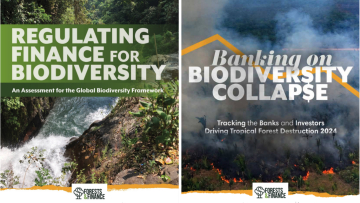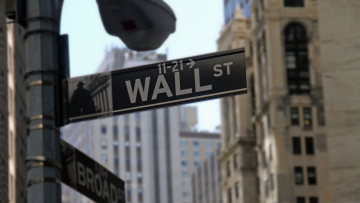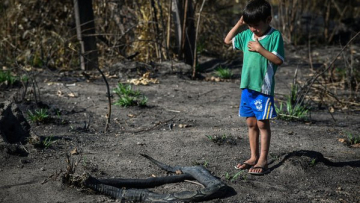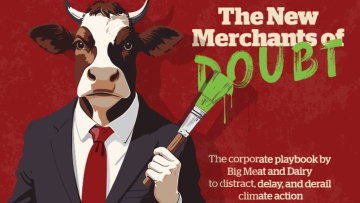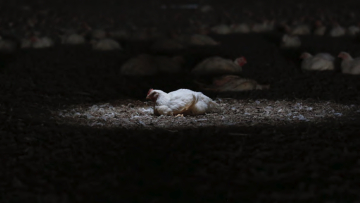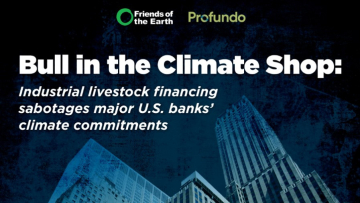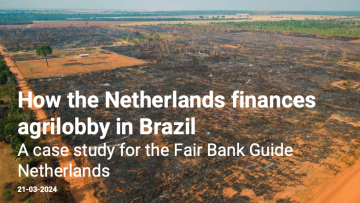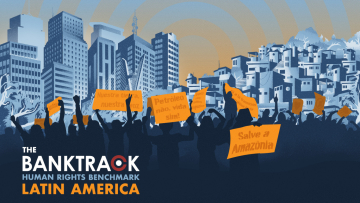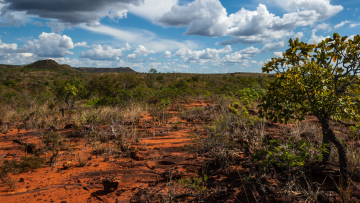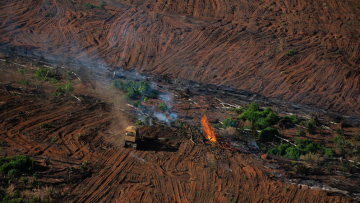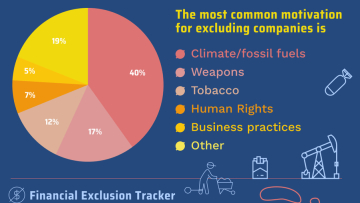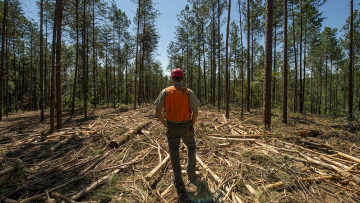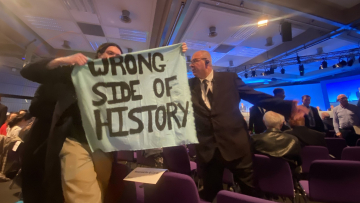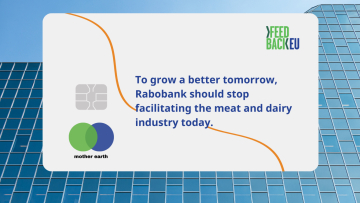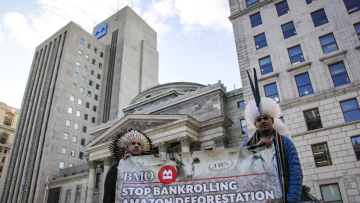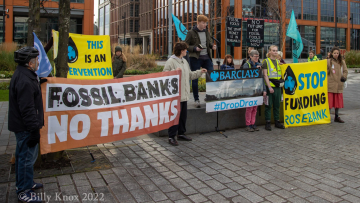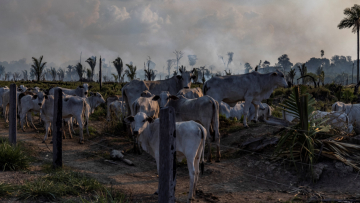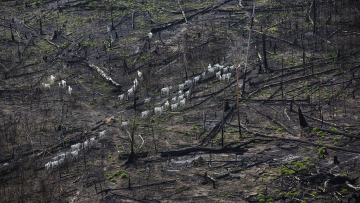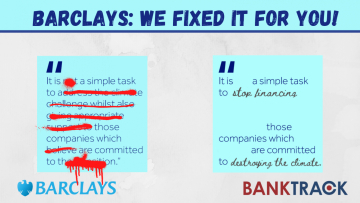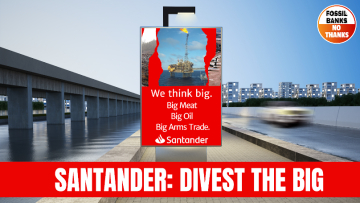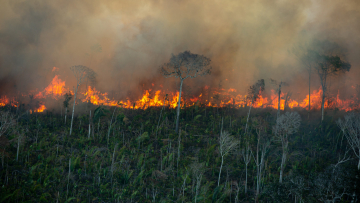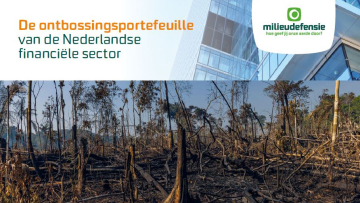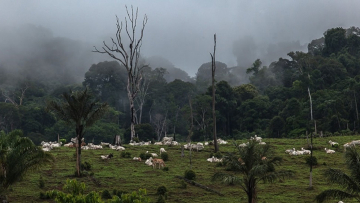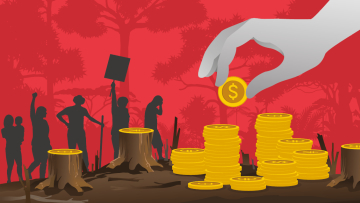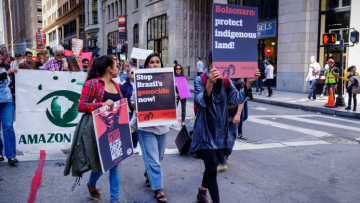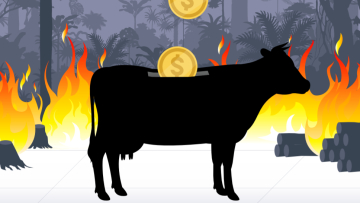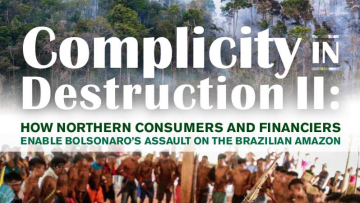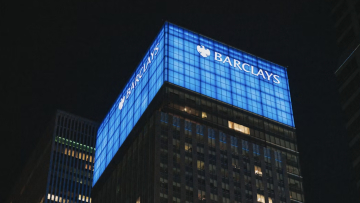
Company – Active
This profile is actively maintainedBankTrack
nature@banktrack.org
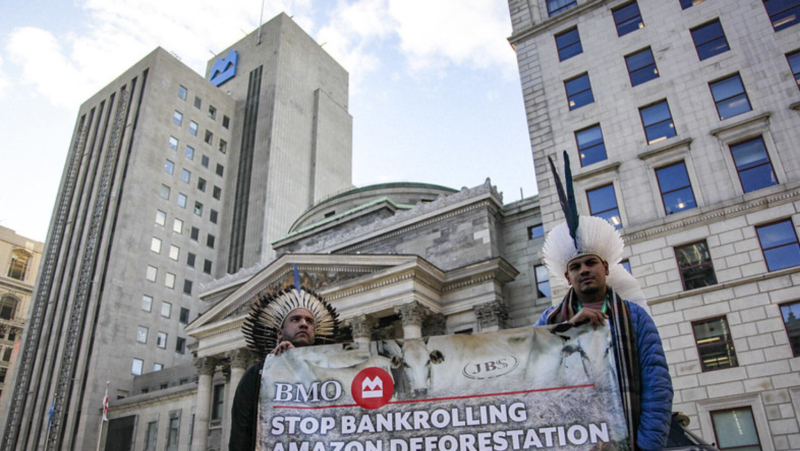
Company – Active
This profile is actively maintainedBankTrack
nature@banktrack.org
Why this profile?
JBS exemplifies the wide array of problems associated with industrial meat production. The company has well documented links to illegal deforestation in the Brazilian Amazon, slave and child labour, and violence against and encroachment of Indigenous lands. It has also been embroiled in several major corruption scandals and is the largest emitter of greenhouse gas emissions in the meat and dairy sector. The company has repeatedly failed to tackle deforestation, human rights violations, or its indirect emissions throughout its direct and indirect supply chains. In the United States alone, JBS has a long record of environmental and employment violations.
What must happen
Banks and other financial institutions should immediately drop JBS as a client. They must also have robust policies in place that exclude companies like JBS which repeatedly break the law and fail to meet international standards or their own commitments related to the environment and human rights protection.
| Take Action! |
| Drop JBS |
| Sectors | Industrial Livestock Production , Commodities Trading |
| Headquarters |
|
| Ownership |
listed on Brazil Stock Exchange
J&F Investimentos, owned by the Brazilian Batista family, holds a controlling portion of shares of 39.99%. JBS' complete shareholder structure can be accessed here. |
| Subsidiaries | |
| Website | http://www.jbs.com |
JBS is the largest meat processing company in the world, producing factory processed beef, pork and poultry products as well as selling by-products from the processing of these meats. Its products are distributed under various brand names, such as Friboi, Swift, Bertin, Pilgrim's, and others. The company also operates related businesses, such as leather, biodiesel, personal care and cleaning, solid waste management, and metal packaging. It has 400 production units, facilities, and offices, of which 230 are used for the production of beef, pork, lamb, and poultry products. JBS is headquartered in São Paulo and has 150 industrial plants around the world.
Impact on human rights and communities
Slave labour The use of slave labour is common in the livestock industry. Despite claims that it has monitoring mechanisms in place that block suppliers including on the “dirty list” – a federal government register that lists employers caught perpetrating this type of crime – numerous reports have repeatedly found that JBS sources from ranchers using slave labour. In 2022, Global Witness reported that JBS had bought cattle from a family of ranchers called Seronni who were alleged to have used slave labour as well as being previously accused of land-grabbing. Greenpeace has also reported that JBS has sourced almost 9,000 cattle from rancher Chaules Pozzebon or his family. Pozzebon is currently serving a 99-year sentence for crimes including leading a criminal gang and has been separately convicted of using slave labour.
Encroachment of Indigenous Peoples land JBS has been accused of sourcing cattle from Amazon land that has been seized from Indigenous Peoples and violent landgrabbers. In 2020, a report by Amnesty International found that JBS has contributed to human rights abuses – including intimidation, threats, forced displacement and murder – against Indigenous peoples and residents of three Indigenous reserves in the Brazilian state of Rondônia by participating in the economic incentives for cattle illegally grazed in protected areas. Investigations by Repórter Brasil have exposed how JBS has bought cattle from the Três Rios farm in Canarana that has illegally raised cattle on the Naruvôtu Pequizal Indigenous Land. The damage caused by this activity has affected almost 10% of the total area of this Indigenous territory and the rancher has been fined R$10.9 million.
Poor working conditions JBS has been linked to poor working conditions in Brazil and the US. A 2019 report by Oxfam-US found that violations of workers' basic rights, such as denying bathroom breaks, were being violated in poultry facilities including some owned by JBS subsidiary Pilgrim’s Pride. Human Rights Watch has also reported on the rate of serious injuries to workers in US meat and poultry plants, including facilities owned by JBS subsidiaries. It has been reported that JBS US subsidiaries have been fined nearly US$34 million for employment-related offences since 2000.
Impact on climate
Methane emissions JBS is responsible for enormous greenhouse gas emissions, primarily in the form of methane from livestock. A study by the Institute for Agriculture and Trade Policy (IATP) and the Changing Markets Foundation found that JBS’ annual emissions footprint for 2021 was an estimated 287.9 million tonnes of CO2 equivalent, which exceeds the overall emissions of Spain. The analysis found that, compared with 14 other global meat and dairy giants, JBS alone is responsible for 40% of the estimated livestock emissions. While JBS has committed to reaching net zero by 2040, this commitment only takes into account its direct emissions, failing to tackle its indirect supply chain emissions which account for 97% of its impact.
“Green” bonds In January 2023, Mighty Earth submitted a complaint to the US Securities and Exchange Commission (SEC) about a JBS “green bond” on the basis that the company has concealed the true scale of its emissions footprint since 2017 by not disclosing the number of animals it slaughters annually, which are the primary source of its GHG emissions. These concerns were echoed by the US National Advertising Division which recommended that JBS stop using its 2040 net zero target in its advertising as the company’s record “does not support the message conveyed” about its climate aspirations.
Impact on nature and environment
Deforestation As far back as 2009, Greenpeace Brazil revealed how JBS and other major meatpackers frequently bought cattle from ranches linked to deforestation. Following this investigation, JBS signed the voluntary Zero Deforestation Cattle Agreement, in which it committed to not source from farms involved in any deforestation, slave labour, or invasions of indigenous lands and protected areas. Despite this, JBS continues to be linked to illegal deforestation throughout its supply chain on multiple occasions. It is estimated that between 2008 and 2020, JBS’ total deforestation footprint is as high as 200,000 hectares in its direct supply chain and 1.5 million hectares in its indirect supply chain. In December 2020, Global Witness reported that, in just one Amazon state between 2017 and 2019, JBS bought from 327 ranches with 20,000 football fields worth of illegal deforestation. The investigation also found that JBS fails to monitor approximately 3,270 ranches further up its supply chain containing an estimated 98,000 hectares of deforestation. JBS is ranked as the worst performing company in Mighty Earth’s Soy and Cattle Deforestation tracker, scoring only 1 out of a possible 100, which scores companies based on the extent, severity and response to forest clearance in their supply chains.
JBS’ net zero plan falls short with regards to its commitment on deforestation. Its plans allow the company to continue to source cattle linked to illegal deforestation in the Amazon and other biomes until 2025 and it has not committed to eliminate all deforestation from its entire supply chain until 2035. However, given the historical commitments made by JBS, there are serious concerns that these commitments will not be met.
Water pollution JBS has been accused of causing water pollution from its slaughterhouses and meat processing facilities in the US. A 2018 report by the Environmental Integrity Project linked eleven JBS-owned slaughterhouses to the nitrogen pollution in numerous rivers across the US. Many of these problems were linked to Pilgrim’s Pride, a JBS subsidiary and one of the largest poultry producers in the US. Mighty Earth has reported that, in 2018 alone, Pilgrim’s Pride’s poultry division produced over 725,000 tonnes of manure and discharged 16,973,640 lbs of water polluting toxins from its facilities between 2012 and 2017.
Impact on pandemics
The further expansion of intensive livestock farming increases the risk of new zoonotic diseases emerging, directly because the expansion of land used for grazing near nature areas increases contact between cattle and wild animals, risking spillover events, and indirectly because the circumstances in which livestock is kept in industrial meat production facilities creates breeding grounds for new varieties of viruses and spillover risks to humans working closely with livestock. The expansion of soy production into previously forested land to be used as feedstock also increases risks, as deforestation and agricultural system change are both considered significant factors in the emergence of zoonotic and vector-borne diseases. In addition, the World Health Organisation has stated that the overuse of antibiotics for livestock is considered one of the biggest current threats to global health, food security, and development. JBS has been ranked as ‘High Risk’ on the FAIRR Initiative’s Emerging Disease Risk Ranking, meaning they score poorly across a set of seven criteria vital to preventing future zoonotic pandemics such as welfare conditions for both animals and workers.
COVID-19 The COVID-19 pandemic showed that workers in slaughterhouses were disproportionately impacted by the virus due to poor working conditions that allowed the virus to thrive and spread. During the pandemic, JBS’ priority was to keep meat processing facilities running with as many workers as possible, with workers in both Brazil and the US reporting that they are forced to work while sick and measures on social distancing and wearing masks were not in place. In 2020, there were two outbreaks in JBS’ largest US plants in Colorado and Minnesota. In July 2020, worker advocacy groups filed a civil rights complaint against both Tyson and JBS on their failure to prevent coronavirus outbreaks among their largely black and Latino workers, alleging that this amounted to racial discrimination. JBS was fined, but later contested this and refused to pay the fine. In Brazil, JBS was the only meatpacking company that resisted an agreement with the Brazilian Public Labour Ministry (MPT) to improve worker safety, until MPT stopped operations at 12 of JBS’ plants and the company took some steps to protect its workers. In August 2020, the MPT estimated that one in five Brazilian meatpacking workers had contracted COVID-19. Outbreaks at the meatpacking facilities made up a large proportion of cases in the local areas around the plant, in both the US and Brazil.
Other impacts
Corruption and bribery The scale of allegations of bribery against JBS stretches from meat inspectors to the highest office in Brazil. Operation ‘Car Wash’ was set up to investigate the bribery scandal that engulfed the Brazilian oil firm Petrobras in 2014. An astonishing network was revealed, stretching far beyond a single company and ultimately bringing down the Brazilian government. In January 2017, JBS executives approached prosecutors offering information on corruption in exchange for leniency as part of Operation Car Wash. One executive admitted to bribing 1,829 politicians to the tune of almost US$100 million. In May 2017, Joesley and Wesley Batista, along with five other executives, signed a plea deal admitting to bribery of politicians. In the same month, JBS was investigated by enforcement authorities in Operation Bullish under suspicion of receiving illegal advantages when securing financing from BNDES. JBS later agreed to pay 10.3 billion Reals (US$3.2 billion) in fines for its role in the various corruption scandals.
2025
2025-05-23 00:00:00 | JBS shareholders vote in favour of NYSE listing
Following the SEC’s approval last month, JBS’ minority shareholders have voted to approve the meat company’s listing on the New York Stock Exchange (NYSE) - the largest global stock exchange. As part of this agreement, the shareholders have made plans for the restructuring of several areas of the company.
One aspect of the restructuring is the increased ownership stake to the Batista brothers - from 48% to 85% of voting power. These two billionaire brothers spent time in jail for corruption offences in 2017, initially being removed from JBS’ governance. The restoring of large majority voting rights under this deal thus raises serious concerns about accountability within the company. The shareholders have also agreed to dual-list JBS, moving its main legal headquarters to the Netherlands. This action may provide tax breaks and other financial benefits for the company, but it also greatly increases its risk of litigation.
Following both the SEC’s and shareholder’s approval, attention now turns towards the NYSE itself. JBS needs to await their approval. If this is granted, the world's largest meat packing company, with a history of human rights, environmental, and climate abuses, as well corruption, will have passed all the required steps to become a traded entity on the largest stock exchange in the world.
2025-04-23 00:00:00 | The U.S. Securities and Exchange Commission (SEC) has approved JBS listing on the New York Stock Exchange (NYSE)
The U.S. Securities and Exchange Commission has approved JBS’s listing on the New York Stock Exchange, opening the door to U.S. capital markets. This decision represents a significant setback for climate action and human rights protections.
With this approval, JBS is now positioned to attract substantial new investment, enabling the continued expansion of the business model that has been consistently linked repeated allegations of human rights violations, child labor, corruption, and illegal deforestation. More financing means more animals raised in inhumane conditions, more deforestation and biodiversity loss, and more emissions driving the climate crisis. JBS’s track record raises serious concerns. Since its initial SEC filing in 2023, JBS’s legal liabilities have more than doubled, now exceeding $3.6 billion. Recent penalties include $83.5 million for price-fixing, $4 million for child labor violations, and $64 million related to illegal deforestation.
This decision comes just after reports surfaced, showing that Pilgrim’s Pride, a poultry company owned by JBS, contributed $5 million to Donald Trump’s inauguration—the largest known corporate donation.
2025-04-17 00:00:00 | New investigation reveals that JBS will not achieve its goal of deforestation-free cattle
A team of journalists from The Guardian, Unearthed, and Repórter Brasil conducted investigations with frontline workers—including ranchers and leaders of ranching unions representing thousands of farms across Pará and Rondônia—which once again reveal that JBS is on track to fail its deforestation pledges.
2025-02-12 00:00:00 | Greenpeace International’s lawyers have challanged a Dutch notary firm Loyens & Loeff on their provision of services to JBS
Lawyers representing Greenpeace International have issued a legal letter to Dutch notary firm Loyens & Loeff, demanding it to take immediate action and assess whether it is appropriate and in accordance with its professional duties to continue to provide legal service to JBS, the world’s largest meat producer with long-standing links to corruption, deforestation and human rights abuses. This warning comes as JBS seeks to relocate its corporate headquarters to the Netherlands - part of its dual listing on the New York Stock Exchange (NYSE). Greenpeace International warns that by supporting JBS’s restructuring, Loyens & Loeff not only enables JBS to further expand its environmental-wrecking business model, but also risks complicity in financial and environmental scandals.
Under Dutch law, financial service providers like international law and tax firms have stringent professional obligations including being expected to conduct strict due diligence to prevent their services from being used to facilitate money laundering, corruption, or other financial crimes. In certain circumstances, they are obliged to refuse to act. Notaries play a critical role in ensuring that corporate transactions do not enable companies with a record of fraud, environmental destruction, or human rights violations. Greenpeace International has warned that Loyens & Loeff’s involvement in JBS’s corporate restructuring could expose the firm to serious legal and reputational risks. Greenpeace International’s lawyers have also submitted a copy of their legal warning to the Bureau Financieel Toezicht (BFT), urging regulators to review the firm’s role in enabling JBS’s expansion as well.
2024
2024-11-27 00:00:00 | JBS Jumps on $2.5 Billion Meatpacking Project in Nigeria
JBS recently announced plans to participate in a $2.5 billion project for the construction of meatpacking facilities in Nigeria — its first expansion into Africa. Investing in Africa would give JBS, which owns processing facilities spanning from Colorado to New Zealand, an opportunity to diversify away from more mature markets including the US. The economy of Nigeria, which has a population larger than Brazil, is expected to more than double by 2050, the company said.
JBS signed a memorandum of understanding with the Nigerian government to build three poultry plants as well as two for beef and one for pork in five years.
2024-05-23 00:00:00 | JBS fined USD 33 million in Brazil for paying bribes to the tax auditor responsible for inspecting the slaughterhouse
JBS S/A was fined R$170 million for paying bribes to someone responsible for inspecting a meat processing plant in Mozarlândia, in the northwest region of Goiás. According to the Federal Comptroller General (CGU), JBS paid more than R$380 thousand to a federal tax auditor from the Ministry of Agriculture, Livestock and Supply (MAPA). According to the CGU, the payment of the bribe was discovered during Operation Risky Conduct, by the Federal Police (PF). The investigation managed to break the auditor's banking secrecy and identified monthly deposits from the company and its employees into the public servant's account.
In a note, the JBS stated that the payments made are related to overtime and occurred in accordance with article 102, item 18 of Decree 30691/1952, which was in force until 2017.
2024-05-14 00:00:00 | Brazil's JBS earns nearly $320 mln in Q1, beating analysts expectations
Brazil's JBS SA reported a net profit of 1.64 billion reais ($319.74 million) for the first quarter 2024, which beat analysts' expectations by a wide margin, according to an earnings statement. After a strong quarter for its U.S. pork business and its beef and processed foods divisions in Brazil, JBS said earnings before interest, tax, depreciation and amortization, a measure of operating income known as EBITDA, was 6.4 billion reais in the period.
Overall, JBS reported a 2.8% rise in net revenue globally to 89.1 billion reais in the quarter, partly reflecting more beef demand in Brazil, its home market. JBS, which derives most of its sales from the U.S., said the first quarter of 2024 was also marked by growth in the average price for wholesale pork cuts in that country, a reflection of stronger demand for that p protein type resulting from the shift in consumption from beef to pork.
2024-04-30 00:00:00 | JBS: cattle rancher fined for deforestation with 'Agent Orange'
Livestock farmer and JBS supplier, Claudecy Oliveira Lemes, was the target of an operation by the Civil Police of Mato Grosso for the illegal deforestation of 81.2 thousand hectares on eleven properties in the municipality of Barão de Melgaço (MT) in the early April. The devastation was carried out with the aerial spraying of 25 types of pesticides and is described by state authorities as the greatest environmental damage ever recorded in Mato Grosso. This drone footage of the area shows the scope of the damage. Lemes is also the owner of Fazenda Monique Vale, located in Pedra Preta (MT), 232 km from where chemical deforestation was recorded. Over the last year, the property sent cattle to be slaughtered at JBS units in Barra do Garças and Pedra Preta (MT).
The rancher’s plan was to grow grass to raise more cattle on the land. However, a court has imposed a fine of 2.8 billion reals (more than US$500 million) and another 2.4 billion reals (US$385 million) in costs for restoring the damage. It has ordered the seizure of the rancher’s cattle and other assets to help cover the costs.
According to the official response provided by the JBS, the six farms registered in the name of the cattle farmer in question are blocked for purchase by JBS.
The full story was covered by Reporter Brasil.
2024-04-26 00:00:00 | Failure to Act: The most recent investigations into JBS deforestation by Mighty Earth and Aid Environment
New analysis by Mighty Earth and AidEnvironment Failure to Act shows the failure of Brazilian meat giant JBS to act on 68 cases of deforestation on cattle farms in the Amazon and Cerrado, sent to the company over a year ago, has resulted in a further 18,458 hectares of preventable destruction of crucial rainforest and natural ecosystems, some close to the ancestral lands of Indigenous peoples. The new research, released ahead of JBS’ AGM in Brazil today finds that, in total, JBS has failed to investigate or verifiably act on 105 deforestation alerts – covering over 185,000 hectares of deforestation – in the two threatened biomes.
2024-04-26 00:00:00 | JBS reappoints the Batista brothers to the board seven-and-a-half years after they were imprisoned in Brazil for their involvement in a notorious bribery case.
During its AGM on April 26, JBS has reinstated the Batista brothers to its board, seven-and-a-half years after they were imprisoned in Brazil for their involvement in a wide-ranging corruption case. The brothers – former JBS chair Joesley Batista and ex-JBS CEO Wesley Batista, stepped down from their respective roles in 2017 after pleading guilty to corruption charges in Brazil, before both spending several months in prison. They were released from custody in 2018.
However, a majority of shares not cast by the Batistas either rejected or did not support their election. Ban the Batistas advocacy group pointed to that the brothers’ own J&F Investimentos investment vehicle is the controlling shareholder of JBS. J&F vehicle represented 1.08 billion shares out of the 1.24 billion share majority that voted in favour of their return to the JBS board. Almost 250 million shares rejected their return, with 500,000 abstaining.
2024-03-07 00:00:00 | JBS net zero “commitment removed” by the SBTi
JBS has not received validation from the Science-Based Targets initiative (SBTi). JBS is listed as "Commitment Removed" on the SBTi website, indicating that it has been removed from the SBTi register. In the past, BankTrack together with other organisations have been advocating against the validation of JBS's net-zero target. The SBTi is a global organisation that aims to help businesses set emissions reduction targets in line with science. SBTi evaluates the Net Zero plans of numerous companies globally to determine if they are credible and ambitious enough to contribute to combating climate change. As JBS has consistently failed to present substantive plans to support its assertions of achieving Net Zero by 2040, SBTi has taken decisive action to revoke its approval. Mighty Earth says that SBTi’s decision not to validate JBS is a further blow to the meat giant’s plans to list on the New York Stock Exchange.
2024-02-28 00:00:00 | NY attorney general is suing JBS for greenwashing
On February 28, 2024, Letitia James, the New York attorney general, filed a lawsuit against JBS USA, the American division of the world's largest meatpacker, for making deceptive claims regarding its efforts to reduce greenhouse gas emissions. This legal action represents a significant setback for JBS, headquartered in Brazil, as it aims to list on the New York Stock Exchange despite a history of criminal activities including bribery, deforestation, human rights abuses, and land grabs against Indigenous peoples. JBS's pursuit of a U.S. listing has been ongoing for over a decade, but it faces mounting challenges, including resistance from the UK lawmakers and bipartisan concerns in the U.S. regarding its criminal and environmental record. The proposed NYSE listing would provide JBS access to additional capital for expansion. The Securities and Exchange Commission (SEC) holds the power to prevent JBS from listing on the NYSE. On January 11th 2024, Mighty Earth has sent a lettter to the U.S Securities and Exchange Commission (SEC) urging it to investigate JBS and halt the proposed IPO.
2023
2023-06-20 00:00:00 | JBS should discontinue its "net zero" claims
In June 2023, the National Advertising Review Board (NARB), the appellate body for the U.S. system of advertising industry self-regulation, recommended JBS USA to stop using misleading claims regarding its goal of achieving "net zero" emissions by 2040. This followed an earlier deision by the National Advertising Division (NAD) that found no evidence of a concrete plan to achieve “net zero by 2040” and advised JB to stop using the misleading claims. JBS appealed NAD’s recommendations. The NARB panel confirmed that the challenged claims indeed conveyed misleading messages, as JBS does not currently have a formulated and vetted plan to achieve net zero emissions by 2040. The NARB panel recommended that JBS discontinue the “net zero” claims, such as:
- “JBS is committing to be net zero by 2040”;
- “Global Commitment to Achieve Net-Zero Greenhouse Emissions by 2040”;
- “Bacon, chicken wings and steak with net zero emissions. It’s possible”;
- “Leading change across the food industry and achieving our goal of net zero by 2040 will be a challenge. Anything less is not an option”; and
- “The SBTi recognized the net zero commitment of JBS.”
JBS expressed disagreement with the NARB's interpretation but agreed to comply with its recommendation in future advertising.
2023-01-18 00:00:00 | Mighty Earth files complaint with US Securities and Exchange Commission against JBS ‘green bonds’
Senior executives at Mighty Earth have filed a whistleblower complaint to the US Securities and Exchange Commission (SEC), calling for a full investigation into alleged misleading and fraudulent “green bonds” issued by the Brazilian meat giant JBS. Evidence presented to the SEC details how JBS, the world’s largest meat processor with operations in over 20 countries, issued $3.2 billion in four separate debt issuances or “green bonds” in 2021, referring to them as Sustainability-Linked Bonds (SLBs) tied to its stated goal to cut its emissions and achieve “Net Zero by 2040.” The heart of the complaint centers on the fact that JBS based the bond offerings on its commitment to achieve net zero emissions by 2040 – but that its emissions have in fact increased in recent years and it excluded ‘Scope 3’ supply chain emissions that comprise upwards of 97% of its climate footprint. It also omitted key information from investors about the actual number of animals it slaughters each year, denying US investors vital information to make fully informed decisions about JBS’s net zero and climate-related claims as they decided whether to purchase these SLBs.
2022
2022-12-15 00:00:00 | Brazil audit finds 17% of cattle bought by JBS came from 'irregular' ranches
Nearly 17% of the cattle bought by JBS SA in Brazil's Para state in the Amazon rainforest allegedly came from ranches with "irregularities" such as illegal deforestation, according to an audit by federal prosecutors. The audit, which examined cattle purchases between July 2019 and June 2020, said that the world's largest meatpacker allegedly bought some 93,734 head from irregular ranchers.
2022-04-21 00:00:00 | JBS increased greenhouse gas emissions by 51% over the last five years
JBS has increased its greenhouse gas emissions by a staggering 51% over the last five years and is now responsible for greater emissions than Italy's annual climate footprint, new research finds. Using an UN-approved methodology, new research contained in a media brief by IATP, Feedback and investigative website DeSmog, found that JBS – which processed 26.8 million cattle, 46.7 million pigs and 4.9 billion chickens last year – increased its annual GHG emissions by 51% in five years from 280 million metric tonnes (mmts) in 2016 to around 421.6 mmts in 2021. This is more than the annual climate footprint of Italy or Spain and close to that of France (at 443 mmt) and the UK (at 453 mmt). It is approximately equivalent to fossil fuel giant Total’s 2020 emissions.




